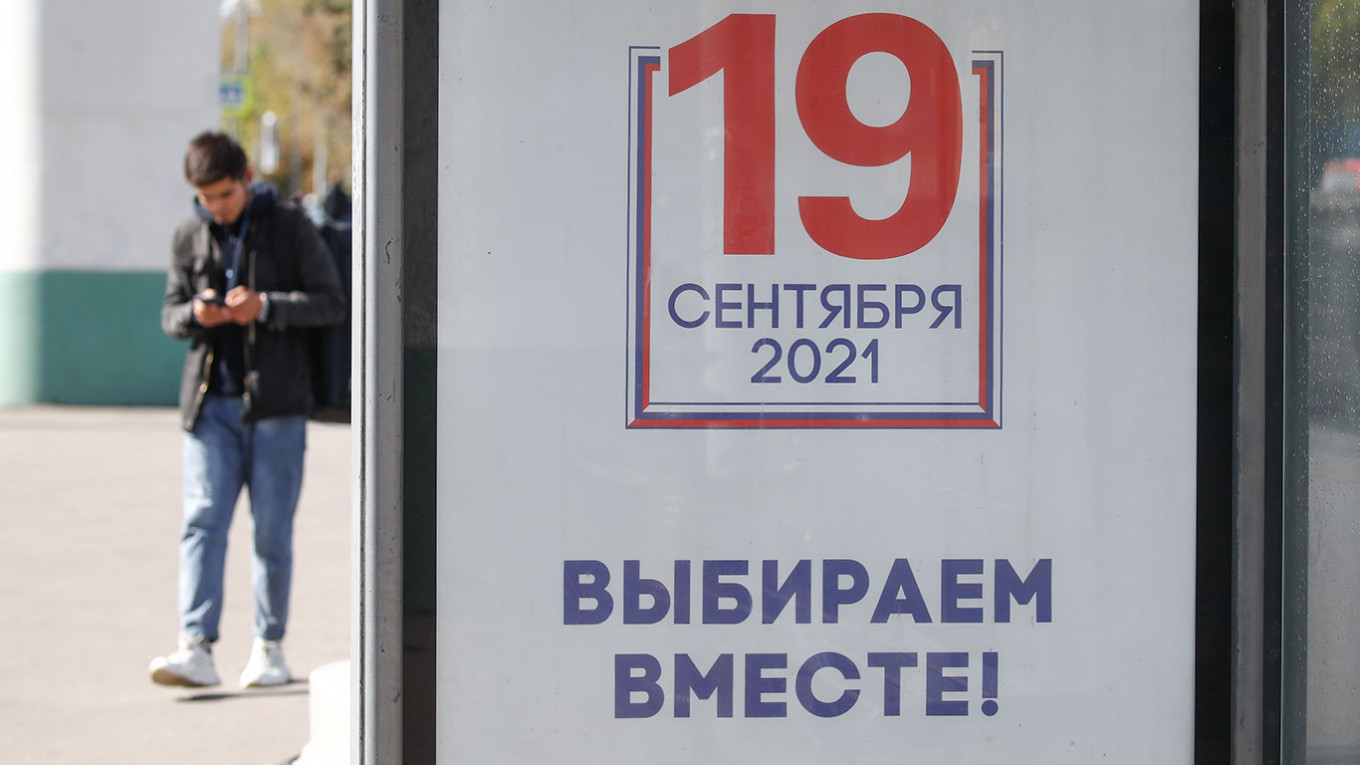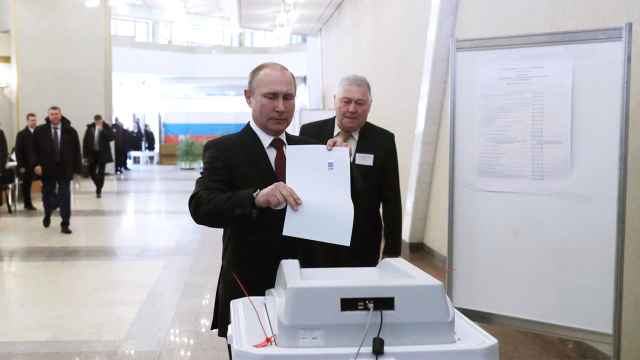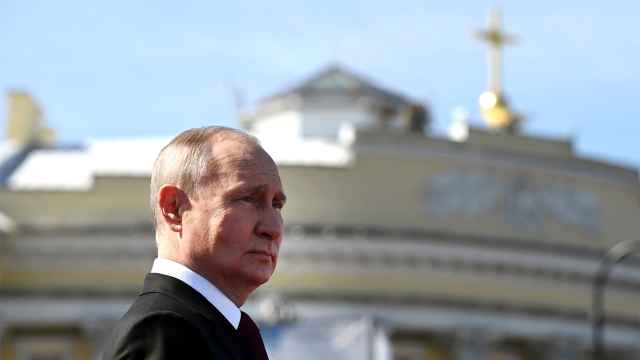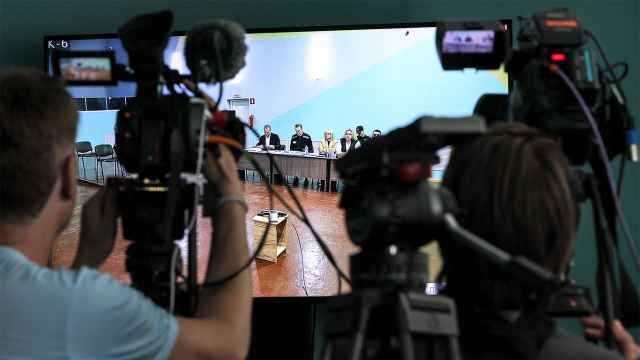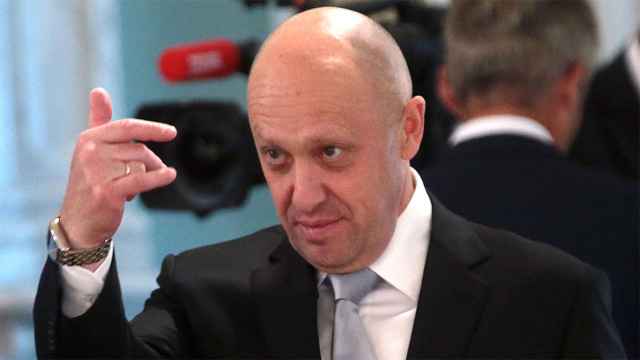Irina, a 34-year-old teacher in Moscow, had no intention of participating in upcoming elections for Russia’s State Duma because she didn’t consider any candidate worthy of her vote. That all changed when she got a message from her boss instructing her to register online for the ballot.
“The management told me voting was part of my duties. They said it was not a choice,” she said by phone on Monday.
As Russia gears up to elect its national parliament, The Moscow Times spoke with seven state employees across the country who said they have been asked — and sometimes pressured — by their employers to vote online in elections seen as a crucial test of the ruling United Russia party’s grip on power.
All of them asked for their surnames to be withheld for fear of reprisals.
Critics say Russian elections have a long history of voter intimidation at work, especially in the bloated public sector, which accounts for a third of jobs in Russia.
According to David Szakonyi and Ora Reuter, two U.S-based academics who have been studying voter intimidation in the workplace in Russia since the 2011 Duma elections, as many as a third of all employers have been pressured to various degrees to vote in elections over the last decade.
“Our post-election surveys show that this is a very prevalent phenomenon. The degree ranges a lot, from encouragement to vote to direct intimidations and threats,” said Szakonyi.
A poll published by the state-funded VTsIOM polling agency on Wednesday said 14% of all employers working at industrial plants in Russia had been confronted with forced voting for the upcoming elections, while almost half of all employers said their bosses had mentioned the elections at work.
“While it’s too early to say, we haven’t seen any indication that voter mobilization will be lower this time,” said Reuter.
Following each election, dozens of videos are posted online showing state business owners mobilizing their employees to vote and using “carousel techniques” — ensuring organized transportation of selected voters to multiple polling booths on the same election day, which allows them to vote twice.
In one such video from the 2011 Duma elections, the mayor of the city of Novokuznetsk, Valery Smolevo, is seen instructing a council of the directors of the city’s biggest corporation to mobilize their employees to vote for United Russia.
“We should do these elections in the right manner so we won’t look bad…. It’s obvious that United Russia should win,” he says in the video.
Kremlin critics and observers say that this time around, the authorities are trying to minimize such occurrences by urging voters to register and vote online.
“The methods have evolved. The Kremlin wants to avoid embarrassing images of “carousel voting” and it’s much easier to get someone to vote online without any monitors in place,” said Roman Yuneman, a former independent politician who now runs the election watchdog Your Choice, which collects complaints from employees who say they are being pressured to vote.
Yuneman himself claims that e-voting fraud resulted in him losing in his run for the Moscow City Duma elections in 2019, the first time online voting was widely used.
Russia has since rapidly expanded its online voting programme. In addition to Moscow, six other regions will allow people to vote online in the fall 2021 Duma elections. Over 1.5 million Muscovites have signed up for the online voting system, including Moscow Mayor Sergey Sobyanin.
“It is quick, easy and safe. All it takes is two or three clicks without leaving the house,” Sobyanin told Russian media last week.
E-voting in Moscow will take place on a platform developed by the mayor’s office, while in other areas it will go through the Gosuslugi government services portal.
The first reports of municipal officials telling their employees to register for online voting started to appear in local media In July and August of this year.
The Russian Election Committee has countered claims that voters are being mobilized, saying they have had "almost no" complaints.
"If there were appeals, then they were mostly anonymous, difficult to verify, and there were not many of them." the committee’s deputy head Nikolai Bulayev told the RIA Novosti news agency. on Sept. 3.
The Moscow Times has since spoken to four employees working in the state education and health care sectors in the capital who said they were ordered to register online to vote. All four, however, said they were not told who to vote for.
“They sent us an email with instructions to vote. The head doctor told us they will follow up on whether or not we voted” said Dmitriy, a 23-year old medic in Moscow. The Moscow Times saw the email but was unable to independently verify its authenticity.
Yuneman believes that even when voters aren't specifically instructed to vote for the authorities, they tend to gravitate towards voting for the ruling party.
“We find that often employees feel like someone is watching over them and vote for United Russian candidates anyway." They get the signals,” he said.
A study previously showed that 33% of employees in Russia believed their employers could learn about their voting choices, which the study concluded made them more likely to vote for the ruling party.
Outside Moscow, however, some employees contacted by The Moscow Times said they had been told to vote for the United Russia candidate.
“During a recent staff meeting, they told us to register and vote for the ruling party. They said it’s the only party that will make sure I get my salary,” said Igor, a bus driver in Yaroslav, the capital of one of the regions that has introduced online voting.
The independent outlet Meduza has reported employers giving instructions to vote for United Russia through messenger apps, social networking sites, or verbally.
Stanislav Andreichuk, co-chair of the independent election watchdog “Golos,” said he was “very concerned about the prospect” of Russia moving toward online voting.
“It's completely untransparent. There are virtually no checks and balances,” he told The Moscow Times.
Golos — whose designation as a "foreign agent” last month will make it harder to monitor elections — also runs an online monitoring platform called Map of Violations that has been registering complaints from voters who say they are being pressured to cast their ballots.
“Traditionally, at least we would be able to send independent monitors to polling stations. With online voting we could have a situation where on the day of the vote, a factory boss will simply stand behind his workers' compter screens and control who they vote for,” Andreichuk said.
He also pointed to the complaints made by Muscovites during the primary elections of the United Russia last May, where there were instances of users logging onto Gosuslugi to find a vote had been recorded on their behalf. Russia’s ministry of digital developments confirmed to business daily Kommersant that several accounts were indeed hacked “due to users having weak passwords.”
Another controversial feature of the online voting system in Moscow — which Central Election Commission head Ella Pamfilova has criticized — allows voters to go back and change their vote as long as voting is ongoing.
Andreichuk expects the authorities to roll out online voting across Russia by the 2024 presidential elections.
“For now, it's a problem for a few regions where online voting is used. But this could be a premise for what is about to come. These could be the last physical elections,” he said.
With interest in politics at a seventeen-year low and ruling United Russia’s popular support at 27% — its weakest in 13 years — state employees will be pivotal for the outcome of this election, experts said, as United Russia is still expected to secure a large majority of seats from a small minority of the electorate.
“For the authorities, it is important that those unhappy with the regime don’t show up and vote,” said Vladimir Gelman, Professor of Russian Politics at the University of Helsinki.
“But that does mean it needs to rely on a core turnout of budget workers to prevent a meagre turnout.”
A Message from The Moscow Times:
Dear readers,
We are facing unprecedented challenges. Russia's Prosecutor General's Office has designated The Moscow Times as an "undesirable" organization, criminalizing our work and putting our staff at risk of prosecution. This follows our earlier unjust labeling as a "foreign agent."
These actions are direct attempts to silence independent journalism in Russia. The authorities claim our work "discredits the decisions of the Russian leadership." We see things differently: we strive to provide accurate, unbiased reporting on Russia.
We, the journalists of The Moscow Times, refuse to be silenced. But to continue our work, we need your help.
Your support, no matter how small, makes a world of difference. If you can, please support us monthly starting from just $2. It's quick to set up, and every contribution makes a significant impact.
By supporting The Moscow Times, you're defending open, independent journalism in the face of repression. Thank you for standing with us.
Remind me later.



